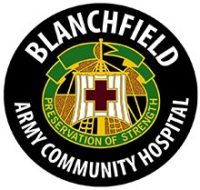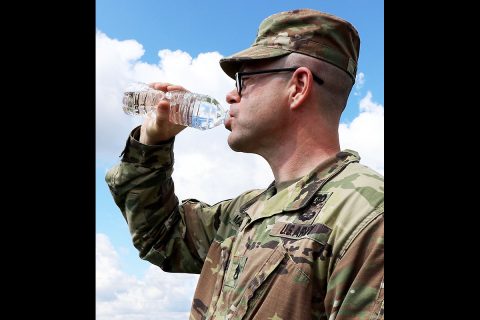 Fort Campbell, KY – With the arrival of warmer weather Blanchfield Army Community Hospital’s dietitians remind beneficiaries to monitor their hydration levels to prevent dehydration and heat related injuries.
Fort Campbell, KY – With the arrival of warmer weather Blanchfield Army Community Hospital’s dietitians remind beneficiaries to monitor their hydration levels to prevent dehydration and heat related injuries.
“The onset of summer heat and humidity as well as Soldiers returning to duty may make individuals more susceptible to dehydration related injuries,” said U.S. Army Dietitian Capt. Erica Jarmer, a registered dietitian assigned to BACH’s Nutrition Care Division.
Jarmer shared two terms for beneficiaries to become familiar with when talking hydration; baseline hydration and performance hydration.

Baseline hydration is the ounces of fluids individuals should consume on a normal day, or a day without significant exertion or time in extreme environments such as heat or humidity. To determine baseline hydration requirements, Jarmer suggests a simple formula of taking body weight divided by two, to calculate baseline hydration.
For example, baseline hydration for a 180 pound individual would be 90 ounces. Baseline hydration for a 120 pound individual would be 60 ounces. The dietitian said the majority of fluid should come from mostly water and zero-and-low-calorie beverages like flavored water and unsweet tea.
Performance hydration is the intake of additional fluids above baseline hydration when engaging in physical activity or in an extreme environment. During these periods Jarmer recommends drinking an additional four to eight ounces of fluid every 15 minutes during this period. If the activity lasts longer than 60 minutes, Jarmer recommends utilizing a sports drink to replenish electrolytes and provide a fuel source.
“Ensuring adequate hydration on a daily basis is very important to optimizing performance,” said Jarmer.
Dehydration occurs when the body uses or loses more fluid than it consumes and doesn’t have enough water and fluid for its normal functions.
Headaches, constipation and lethargy can result from mild dehydration.
Moderate dehydration may result in muscle weakness, dizziness and headache. This may interfere with athletic performance like physical training, ruck marches and field exercises. Exertion with cramped, tense muscles commonly result in muscle strains, tears and bone fractures, making proper hydration an important aspect to readiness.
“We have seen a spike in rhabdomyolysis and heat related injuries already this summer,” said Jarmer. These types of injuries can be mitigated by proper hydration and proper progression of physical activity.
In addition to drinking enough fluids, Jarmer said individuals may monitor their hydration by checking their urine.
Monitoring urine color, first thing in the morning, is a simple way for Soldiers and beneficiaries to gauge their hydration status. Pale or light yellow urine can indicate that an individual is well hydrated. Darker yellow indicates dehydration and brown urine may indicate serious dehydration and a need for medical attention.
The Nutrition Care Division at Blanchfield Army Community Hospital is available to answer questions for beneficiaries and provide unit level training for Soldiers of the 101st Airborne Division (Air Assault) and Fort Campbell. They regularly publish nutrition information on the Blanchfield Army Community Hospital Facebook page at www.facebook.com/BACH.FortCampbell
To learn more about how nutrition and hydration can support optimal performance beneficiaries may contact the team at usarmy.campbell.medcom-bach.mesg.nutrition-clinic@mail.mil



